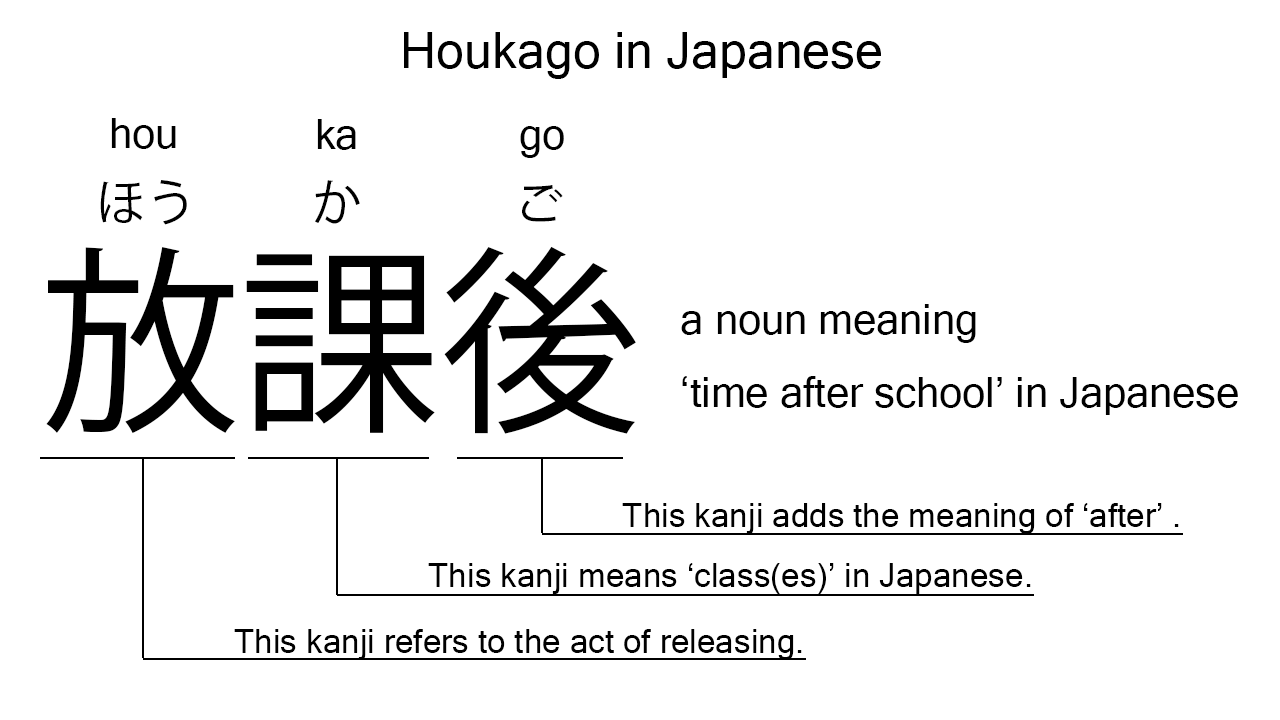What does “houkago” mean in Japanese?
Native speakers say “houkago” to mean ‘time after school’ or just ‘after school’ in Japanese. Perhaps, some Japanese learners know this word as it is sometimes used in Japanese movies, songs, novels, manga, anime, and the like. In this blog post, however, I will explain this word in detail based on its kanji expression. And also, I will explain how to use it through example sentences. My explanations would help Japanese learners understand “houkago” more clearly. Then, let’s get started!
Contents
Definition and meanings of “houkago”
Let me start with the definition and meanings of “houkago”.
- houkago – 放課後 (ほうかご) : a noun meaning ‘time after school’ in Japanese, but can also be used like an adverb to mean just ‘after school’ in Japanese.
The definition and meanings are not that difficult. To understand this noun more clearly, however, let me explain its kanji characters in detail, one by one.
Houkago in kanji
The kanji expression of “houkago” consists of the following three kanji characters:
- 放 : a kanji character used to refer to the act of releasing in Japanese.
- 課 : a kanji character used to mean ‘task’, ‘class’, or such in Japanese.
- 後 : a kanji character often used as a prefix or suffix to add the meaning ‘after’ in Japanese.
These three kanji characters tell us that the formed noun literally means ‘after being released from classes’ in Japanese. This literal interpretation is very close to the actual meanings, I think.

When we meet new kanji expressions, we should check their kanji characters in detail to understand their meanings clearly and deeply. In many cases, kanji characters tell us a lot about the meanings of the expressions they form. Actually, here, we could get the better understanding of “houkago” through the detailed kanji check above.
So far, I’ve explained the definition and meanings of “houkago” together with its kanji characters. Then, let me explain how to use it through the example sentences below.
Example #1: how to say “after school” in Japanese
boku wa houkago ni kanojo to at ta – 僕は放課後に彼女と会った (ぼくはほうかごにかのじょとあった)
I met with her after school.
Below are the new words used in the example sentence.
- boku – 僕 (ぼく) : a pronoun meaning ‘I’ in Japanese. This is used mainly by boys and young males.
- wa – は : a binding particle working as a case marker or topic marker. In the example, this works after “boku” to make the subject in the sentence.
- ni – に : a case particle used to say when someone does something. In the example, this is used after “houkago” to say when the speaker met with her.
- kanojo – 彼女 (かのじょ) : a pronoun meaning ‘she’ in Japanese.
- to – と : a case particle used to say with whom someone does something. In the example, this is used after “kanojo” to say with whom the speaker met after school.
- at – 会っ (あっ) : one conjugation of the verb, “au”, which means ‘to meet’ in Japanese. In the example, it has been conjugated for the better connection with its following word.
- ta – た : an auxiliary verb used after a verb, adjective, or auxiliary verb to make its past tense form. In the example, this is used after “at” to make its past tense form, “at ta”.
This is a typical usage of “houkago”. In this example, it works together with the case particle, “ni”, to make the adverb phrase which means ‘after school’ in Japanese.
Example #2: another usage of “houkago”
boku tachi wa houkago hamabe ni it ta – 僕達は放課後浜辺に行った (ぼくたちはほうかごはまべにいった)
We went to the beach after school.
Below are the new words used in the example sentence.
- tachi – 達 (たち) : a suffix used after a noun or pronoun to make its plural form. In the example, this is used after “boku” to make its plural form, “boku tachi”, which means ‘we’ in Japanese. Learn more about Japanese plural.
- hamabe – 浜辺 (はまべ) : a noun meaning ‘beach’ or such in Japanese. This can also work as plural.
- ni – に : a case particle used to say where someone or something goes. In the example, this is used after “hamabe” to say where the speakers went after school.
- it – 行っ (いっ) : one conjugation of the verb, “iku“, which means ‘to go’ in Japanese. In the example, it has been conjugated for the better connection with its following word.
This is another typical usage of “houkago”. In this example, it works like an adverb in the middle of the sentence to mean ‘after school’ in Japanese. When we want to refer to the time after school in Japanese, anyway, “houkago” is always a very good option.
Summary
In this blog post, I’ve explained the definition and meanings of “houkago” in detail based on its kanji expression. And also, I’ve explained how to use it through the example sentences. Let me summarize them as follows.
- houkago – 放課後 (ほうかご) : a noun meaning ‘time after school’ in Japanese, but can also be used like an adverb to mean just ‘after school’ in Japanese. These three kanji characters literally mean ‘after being released from classes’ in Japanese. This literal interpretation is very close to the actual meanings, I think.
Hope my explanations are understandable and helpful for Japanese learners.